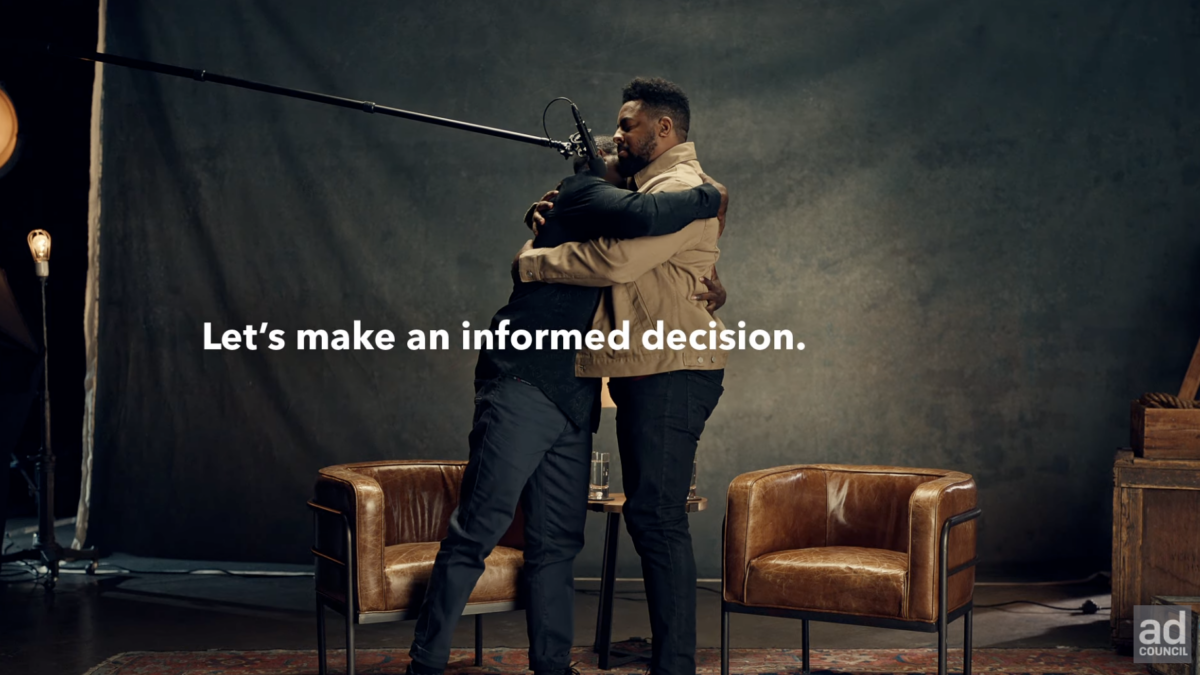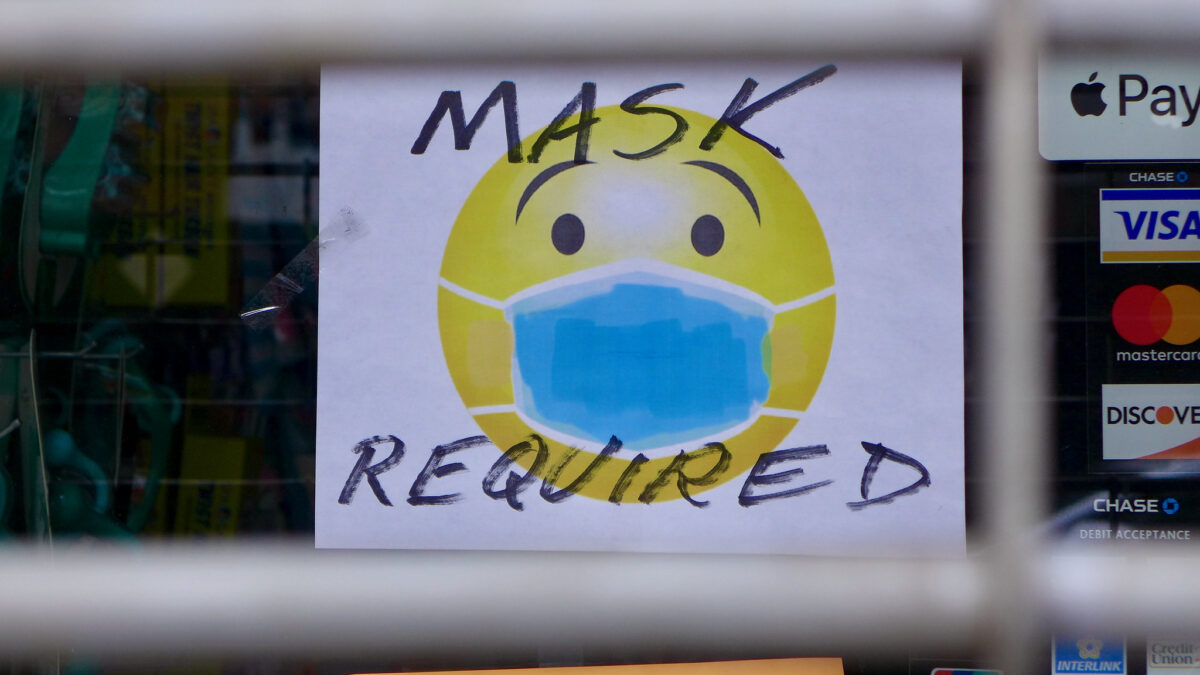The Ad Council, a nonprofit that produces public service announcements, has spent tens of millions of dollars on ad campaigns in an attempt to convince you to get a Covid jab, and they’re using emotional manipulation to try to get your consent.
An ad targeting unvaccinated young adults ran during the first college football game of the season between two top-five teams. Two cozy chairs are set against a dark backdrop and warm lighting as twenty-somethings try to convince loved ones such as brothers, friends, and boyfriends to get the Covid shot. “I’ve been 100 percent into getting vaccinated,” a solemn girl with purple hair tells her boyfriend. “But then I asked you, and you hesitated.”
Many people skeptical of the Covid shots have undoubtedly found themselves in a similar situation over the last year and a half. What follows is not what we all wish would have happened in those conversations, though: an intelligent back and forth weighing risks and benefits and the quality of evidence available, colored with respect for personal autonomy. Instead, it’s an elevation of peer pressure and misinformation as appropriate ways to convince young people to take the jab.
One female participant in the ad encourages her friend to get the jab “to protect the strangers.” Another participant asks his boyfriend to imagine “being the person that goes to somebody’s house and gives them a virus that kills them.” Such guilt-tripping and fear-mongering is common in the Covid era, but the shots clearly don’t prevent infection and therefore do not prevent transmission, as evidenced by massive post-vaccination waves of Covid infections and hospitalizations.
Besides, believing someone is morally responsible any time they unknowingly pass on a disease that might kill someone is psychologically crippling. Who could bear to leave their home under the burden of ensuring they never spread such a highly contagious virus? This kind of thinking deserves no place in a so-called “PSA.”
The Ad Council lined up $50 million to promote Covid vaccines in late 2020 and has produced many ads toward this end. They’re funded by a variety of corporate entities, including Google, Facebook, Twitter, Pfizer, and Johnson & Johnson. Their website states they didn’t receive any funding from pharmaceutical companies or “political organizations” for their vaccine campaigns specifically, but their “COVID Collaborative” is “with the involvement of the Centers for Disease Control and Prevention (CDC).”
Serious Risks for Low-Risk Demographics
This is not just a “whoopsie” by the Ad Council for letting the featured participants use their own words. They also promoted “Sesame Street’s” Big Bird getting his vaccine in order to encourage children, an extremely low-risk demographic, to get the shot. Big Bird’s mom says, “Covid vaccines are the best way to keep yourself, our friends and neighbors, and me safe and healthy.”
Instead of an ad featuring experts sharing evidence about vaccine efficacy and addressing safety concerns, they chose to lean on young people’s emotions and misconceptions. It is not just unethical, it’s infantilizing.
The risk of Covid hospitalization among young adults was low even pre-vaccine, which makes their emotionally manipulative effort to get them to take a shot that doesn’t prevent transmission even more inane. In 2020, pre-vaccination, those under the age of 44 made up only 2.6 percent of Covid-related deaths reported to the CDC (see Table 1). To date, there have been a little over 6,500 Covid-associated deaths among those aged 18-29 out of some 45 million Americans in this age group.
Toward the end of the ad, the pro-vaccine brother leans in toward his sibling and says, “I want you to get the vaccine because I want you to be safe.” We all want our loved ones to be safe, but the shots don’t come without known risks. They have already shown “alarming” rates of adverse events in multiple passive reporting systems compared to other traditional vaccines. No specifics about potential downsides to the shots are discussed in the ad, however — just general, unaddressed worries from the vaccine-hesitant about whether the shots are safe and well-tested.
This published research paper analyzing adverse event reports in Europe and the U.S. compared the frequency of adverse event reports from Covid shots to those related to flu shots. The author found, “Some serious reactions such as cerebral thrombosis and cerebral venous (sinus) thrombosis have been reported much more frequently after COVID-19 vaccination (combined mRNA and adenovirus-vectored vaccines) in comparison to influenza vaccines among adults.” He notes, “There is a large excess risk of death, hospitalisation and life-threatening reports for all COVID-19 vaccines in comparison to the influenza vaccines.”
The authors of that study found the risk of these events was highest among the elderly. However, the risk of myocarditis among young adults post-vaccination is acknowledged by the CDC. Initial estimates out of Israel put the myocarditis risk for the initial Pfizer vaccine series at 1 in 3,000 to 1 in 5,000 for young males aged 16-24. Our own FDA is concerned enough about it that it has required Pfizer to perform a study of the incidence of myo/pericarditis after administration of its jab with at least five years of follow-up.
Using Feelings to Manipulate Is Always Wrong
“If you were to die, man. That would literally kill me, man,” the brother says, a tear streak evident on his cheek.
The hesitant brother appears to concede. “If it makes you feel that way, I’d probably do it.”
Everyone will plead with a loved one at some point to make better health decisions, to take better care of themselves. Usually, this is about poor nutrition, a sedentary lifestyle, smoking, social media addiction, or substance abuse. We speak up because we care, and the evidence these things are bad for you is abundant and fairly straightforward, in most cases going back many decades.
Perhaps it is because the evidence in favor of Covid shots is hotly contested that the Ad Council opted not to discuss any evidence or specific safety issues, but rather to highlight misinformed young people trying to guilt their loved ones into taking the experimental drug.
The Ad Council appears just as committed to maximum vaccination today as they were in December of 2020, despite what the last 20 months have revealed, not just the shot’s adverse effects but its failure to contain the spread of SARS-COV-2. Seriously considering the risks and downsides of Covid vaccination, like waning protection and repeat boosters with unknown long-term effects, doesn’t seem to be on the agenda.
The Ad Council’s “Covid Collaborative” made a promise to ensure Americans have “accurate and timely information to answer their questions and concerns,” but all they want is to overcome objections at any cost. People who break their promises and lie to you can’t be trusted.









